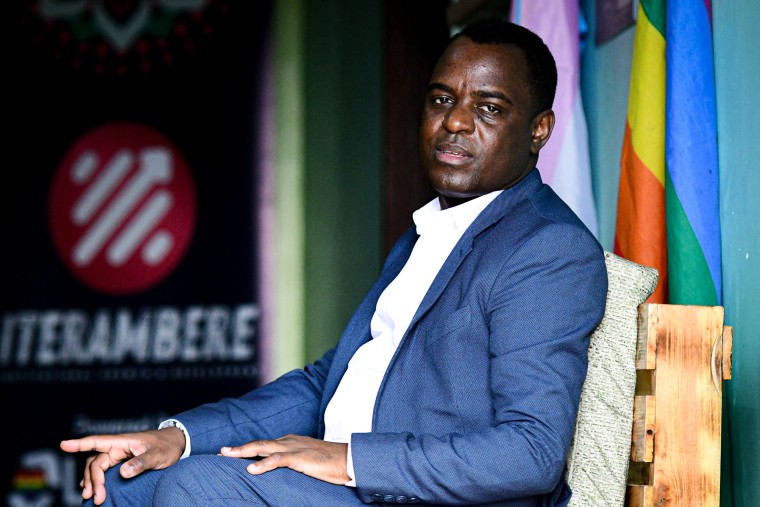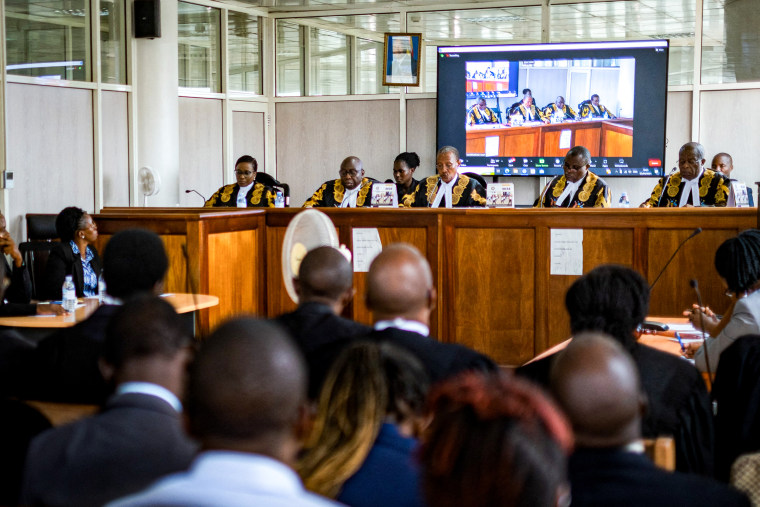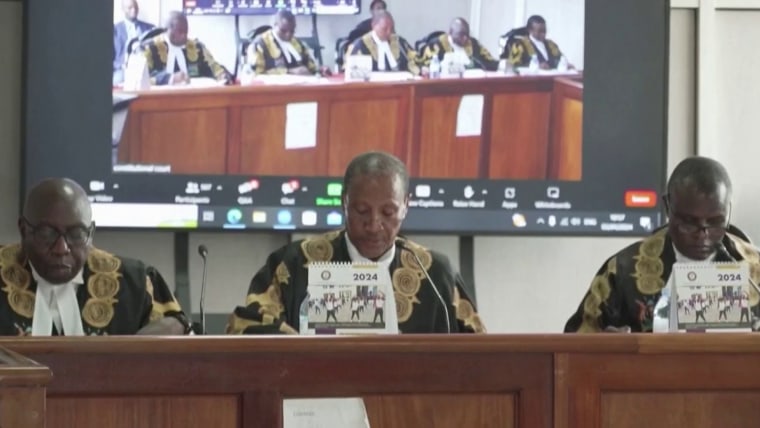Uganda’s most prominent LGBTQ activist says newly upheld anti-gay law will prompt violence
Frank Mugisha said he is bracing for violence in the East African nation after its constitutional court upheld an anti-gay law that includes the death penalty.


Frank Mugisha said he is bracing for violence in the East African nation after its constitutional court upheld an anti-gay law that includes the death penalty.

Ugandan LGBTQ activist Frank Mugisha in Kampala, Uganda, on March 30, 2023.
Abubaker Lubowa / Reuters
April 3, 2024
By Matt Lavietes and Erin McLaughlin
Uganda’s most prominent LGBTQ activist condemned a constitutional court’s decision Wednesday to uphold an anti-gay law that permits the death penalty in certain cases.
Speaking with NBC News from New York City, Frank Mugisha called the ruling a form of “state-sanctioned homophobia” and said he is bracing for violence in the East African nation.
“This ruling intensifies violations towards the LGBT community,” Mugisha said. “It is like the judges have told Ugandans: ‘Go and get violent towards the LGBTQ community.’”
April 3, 2024
By Matt Lavietes and Erin McLaughlin
Uganda’s most prominent LGBTQ activist condemned a constitutional court’s decision Wednesday to uphold an anti-gay law that permits the death penalty in certain cases.
Speaking with NBC News from New York City, Frank Mugisha called the ruling a form of “state-sanctioned homophobia” and said he is bracing for violence in the East African nation.
“This ruling intensifies violations towards the LGBT community,” Mugisha said. “It is like the judges have told Ugandans: ‘Go and get violent towards the LGBTQ community.’”

Ugandans around the world have protested the anti-gay legislation.
Mark Kerrison / In Pictures via Getty Images file
Ugandan President Yoweri Museveni signed the legislation into law last year, drawing condemnation from LGBTQ activists from around the world. Conversely, the law has broad support among the country’s population.
The law allows the death penalty in cases of “aggravated homosexuality,” which it defines as cases of same-sex relations involving a minor and other categories of vulnerable people, or when one of the individuals has HIV. A suspect convicted of “attempted aggravated homosexuality” can be imprisoned for up to 14 years, and the offense of “attempted homosexuality” is punishable by up to 10 years.
Homosexuality was already illegal in Uganda under a colonial-era law criminalizing sexual activity “against the order of nature.” The punishment for that offense remains life imprisonment.
More than 60 countries — mostly in Africa and the Mideast — have criminalized homosexuality, according to Human Rights Watch, but Uganda’s anti-gay law is considered one of the harshest.

Uganda court upholds most of country's anti-LGBTQ law
02:24
The Biden administration sanctioned the Ugandan government and restricted visas of Uganda officials following the law’s passage last year. Uganda’s government then accused the United States of pushing an “LGBT agenda.”
Mugisha said the U.S. needs to do more.
“The U.S. government has got a very good relationship with Uganda,” Mugisha said. “I think there are so many bilateral relationships that they can engage in. It could be behind the scenes advocacy, it could be public advocacy, but they should engage more.”
Ugandan President Yoweri Museveni signed the legislation into law last year, drawing condemnation from LGBTQ activists from around the world. Conversely, the law has broad support among the country’s population.
The law allows the death penalty in cases of “aggravated homosexuality,” which it defines as cases of same-sex relations involving a minor and other categories of vulnerable people, or when one of the individuals has HIV. A suspect convicted of “attempted aggravated homosexuality” can be imprisoned for up to 14 years, and the offense of “attempted homosexuality” is punishable by up to 10 years.
Homosexuality was already illegal in Uganda under a colonial-era law criminalizing sexual activity “against the order of nature.” The punishment for that offense remains life imprisonment.
More than 60 countries — mostly in Africa and the Mideast — have criminalized homosexuality, according to Human Rights Watch, but Uganda’s anti-gay law is considered one of the harshest.

Uganda court upholds most of country's anti-LGBTQ law
02:24
The Biden administration sanctioned the Ugandan government and restricted visas of Uganda officials following the law’s passage last year. Uganda’s government then accused the United States of pushing an “LGBT agenda.”
Mugisha said the U.S. needs to do more.
“The U.S. government has got a very good relationship with Uganda,” Mugisha said. “I think there are so many bilateral relationships that they can engage in. It could be behind the scenes advocacy, it could be public advocacy, but they should engage more.”

Ugandan officials deliver a judgment on the consolidated petitions challenging the constitutionality of the Anti-Homosexuality Act in Kampala on Wednesday.
Badru Katumba / AFP - Getty Images
Mugisha said he is worried about going back to his home country and facing what he described as “violence that would come from the state.”
“I am petrified,” he said. “If the judges can give such a ruling, that means there is no protection for any LGBTQ person in Uganda, and I’m not immune to that.”
“Uganda is ground zero for homophobia,” he added.
Mugisha said he is worried about going back to his home country and facing what he described as “violence that would come from the state.”
“I am petrified,” he said. “If the judges can give such a ruling, that means there is no protection for any LGBTQ person in Uganda, and I’m not immune to that.”
“Uganda is ground zero for homophobia,” he added.
Ugandan gay rights activists asked the international community to mount more pressure on the government of Uganda to repeal an anti-gay law which the country’s Constitutional Court refused to nullify on Wednesday
By RISDEL KASASIRA Associated Press
April 4, 2024
KAMPALA, Uganda -- Ugandan gay rights activists asked the international community to mount more pressure on the government of Uganda to repeal an anti-gay law which the country's Constitutional Court refused to nullify on Wednesday.
Activist Frank Mugisha said Tuesday’s ruling was “wrong and deplorable.”
“This ruling should result in further restrictions to donor funding for Uganda — no donor should be funding anti-LGBTQ+ hate and human rights violations,” said Mugisha.
The court upheld a law that allows the death penalty for “aggravated homosexuality,” and up to 14 years in prison for a suspect convicted of “attempted aggravated homosexuality.” The offense of “attempted homosexuality” is punishable by up to 10 years.
President Yoweri Museveni signed the Anti-Homosexuality Act into law in May last year. It's supported by many in the East African country but widely condemned by rights groups and others abroad.
The court ordered that members of the LGBT community should not be discriminated against when seeking medicine, but U.S. Secretary of State Antony Blinken on Tuesday dismissed that concession as a “small and insufficient step towards safeguarding human rights.”
“The remaining provisions of the AHA pose grave threats to the Ugandan people, especially LGBTQI+ Ugandans and their allies, undermine public health, clamp down on civic space, damage Uganda’s international reputation, and harm efforts to increase foreign investment,” he said.
White House national security adviser Jake Sullivan said Thursday the court’s decision “is deeply disappointing, imperils human rights, and jeopardizes economic prosperity for all Ugandans.”
Sullivan said President Joe Biden’s administration “continues to assess implications of the AHA on all aspects of U.S. engagement with the Government of Uganda and has taken significant actions thus far,” including sanctions and visa restrictions against Ugandan officials and reduced support for the government, he said. “The United States will continue to hold accountable individuals and entities that perpetrate human rights abuses in Uganda, both unilaterally and with partners around the world."
A Ugandan human rights advocate who was a petitioner in the case, Nicholas Opiyo, expressed his disappointment.
“While we respect the court, we vehemently disagree with its findings and the basis on which it was reached. We approached the court expecting it to apply the law in defense of human rights and not rely on public sentiments, and vague cultural values arguments,” said Opiyo.
Homosexuality was already illegal in Uganda under a colonial-era law criminalizing sexual activity “against the order of nature.” The punishment for that offense is life imprisonment.
___
Associated Press writer Lou Kesten in Washington contributed.


No comments:
Post a Comment